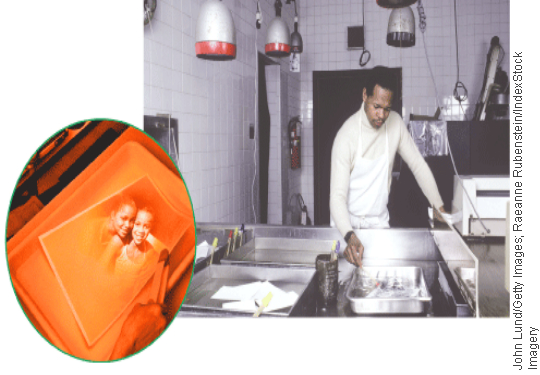Why Study Chemistry?
Should you use hot water or cold water to remove sunblock from a shirt? How could studying chemistry help you to be a better nurse, firefighter, reporter, or chef? If your local government wanted to build a solid waste incinerator in your town, what questions would you ask about the project? Chemistry can have an impact on all aspects of your life. Chemistry can be useful in explaining the natural world, preparing people for career opportunities, and producing informed citizens.
Explaining the Natural World
You were born with a curiosity about your world. Chemistry can help you satisfy your natural desire to understand how things work. For example, chemistry can be seen in all aspects of food preparation. Chemistry can explain why peeled apples turn brown upon exposure to air. It can explain why the texture of eggs changes from runny to firm as eggs are boiled or scrambled. Chemistry can explain why water expands as it freezes, sugar dissolves faster in hot water, and adding yeast to bread dough makes the dough rise. After you study this textbook, you will know the answers to these questions and many more.
Preparing For a Career
Being a chemist can be rewarding. Section 1.2 will present some examples of how chemists contribute to society. In this book, you will find features on careers that require knowledge of chemistry. Some of the choices may surprise you. You do not need to have the word chemist in your job title to benefit from knowing chemistry. For example, a firefighter must know which chemicals to use to fight different types of fires. A reporter may be asked to interview a chemist to gather background for a story. Turf managers are admired for the patterns they produce on a ball field while mowing grass, but their more important task is keeping the grass healthy, which requires an understanding of soil chemistry. A photographer, like the one in Figure 1.4, uses chemical processes to control the development of photographs in a darkroom.

Figure 1.4 Even after the invention of the digital camera, many photographers still work with film. They use chemical processes to develop film and produce prints in a darkroom. Inferring Why isn't film developed under natural light conditions?
Being an Informed Citizen
Industry, private foundations, and the federal government all provide funds for scientific research. The availability of funding can influence the direction of research. Those who distribute funds have to balance the importance of a goal against the cost. Because there is a limit to the money available, areas of research often compete for funds.
For example, space exploration research could not take place without federal funding. Critics argue that the money spent on space exploration would be better spent on programs such as cancer research. Those who support space exploration point out that NASA research has led to the development of many items used on Earth. These include smoke detectors, scratch-resistant plastic lenses, heart monitors, and flat-screen televisions. What if all the money spent on space exploration was used to find a cure for cancer? Are there enough valid avenues of research to take advantage of the extra funding? Would there be qualified scientists to do the research?
Like the citizens shown in Figure 1.5, you will need to make choices that will influence the development of technology. You may vote directly on some issues through ballot initiatives or indirectly through the officials you elect. You may speak at a public hearing or write a letter to the editor or sign a petition. When it comes to technology, there is no one correct answer. But knowledge of chemistry and other sciences can help you evaluate the data presented, arrive at an informed opinion, and take appropriate action.

Figure 1.5 By registering to vote, these citizens in Chicago, Illinois, can have a say in the decisions made by their government. Those decisions include how much money to provide for scientific research.